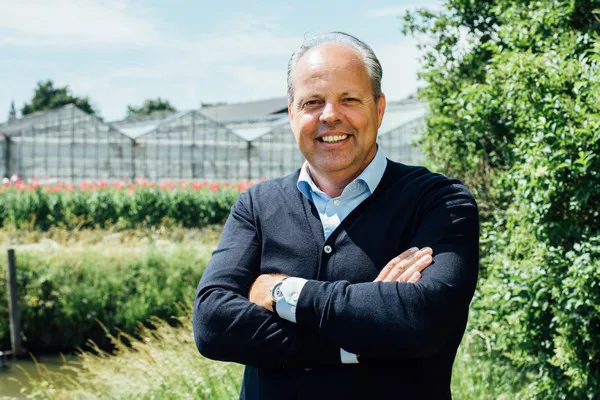It is often said that flowers are particularly susceptible to crises. The moment the consumer has less to spend, plants get crossed off the shopping list. "But what we've seen recently is actually what a wonderful product we have", says Wim van der Plas, CEO of Floral Trade Group (FTG). "As illustrated by the great sales during the recent Mother's Day season in countries like Switzerland, France and Germany, we offer something for people to make each other happy, for a relatively low amount of money."

FTG, one of the biggest players in Dutch ornamental exports with an estimated turnover of 350 million euros, looks back on a couple of turbulent months. "Everywhere small retailers, garden centers and florists, particularly in countries like Italy and France, have suffered major blows", Wim says. "There were situations when a supermarket was selling bouquets, while the florist on the other side of the street had to watch it all empty-handed, with both those companies being our customers. Retail continued, at the expense of the specialized shops, a situation that continued for up to 8 weeks in these countries. Damage was done there that can't be undone anymore this year."
When Italy went into lockdown in March, followed by almost all of Europe, everything was out of control for a while. "Suddenly that has top priority: how are we going to survive this? We called together a crisis team. Practically all investments were put on hold, including a takeover that was in process. Controlling costs, and cash is king, those ideas prevailed. All of a sudden, you don't know whether your customers will be able to pay, and that with a lot of outstanding charges. Nobody knew if it would last for a week, 3 weeks, or 3 months. Our worst case scenario was based on three months, followed by another 3 months of 50% turnover."
But things can turn around quickly, as we've seen. Markets opened up again, and customers returned, often a lot faster than expected. "The way things are now, I didn't dare to imagine at the end of March. All shops and retailers we supply to, have opened up again. Some channels and markets are still a bit difficult or under restrictions, but in e-commerce things are going well. The bank also committed early on, and we haven't had to lay off anyone. We did scale back our agency workers in order to keep our own people at work as much as possible. Usually, people could still go to work in other branches of the company: this nicely illustrates the power of the collective."
Whether government aid is to be expected and realistic, is still not entirely clear. "We're hoping for some compensation, but we don't have that guarantee in writing, even though we've missed out on tens of millions of euros in revenue. On the other hand, this is not the most important aspect. What matters much more is that the growers, some of whom desperately need it, have received support. This whole situation has once again shown how much we need the growers. We're nothing without them, and vice versa. That was also new about this whole crisis situation: no matter how desperate things got, we weren't just concerned about our own survival, but also about that of all our partners. It happened to us as a collective. That definitely brought about a sense of community, but, strange as it may sound, also some peace of mind in the midst of chaos."
In the end, Wim concludes, the projected turnover won't be made, but they're still hoping for a positive results at the end of the year. "We suffered a big hit, but all in all I'm reasonably pleased now. I didn't dream that we'd be at this stage already. Of course you can't know how the market will develop. For now, we're able to get our products at a reasonable price. But if the markets that are currently being restricted get the green light and there are shortages, things could become difficult again. Anyway, slowly but surely we're regaining our confidence."
For more information:
Floral Trade Group
www.floraltradegroup.com
